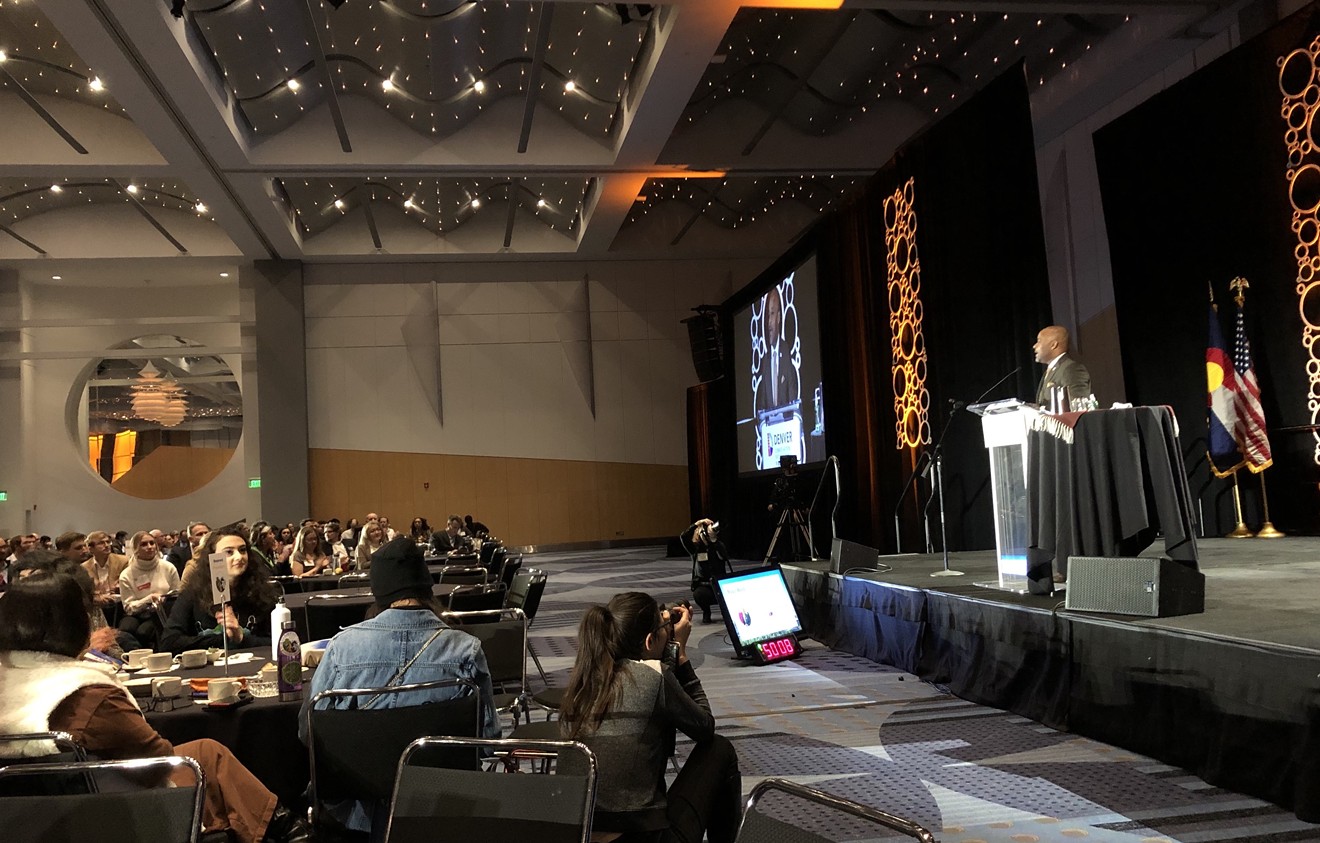On stage at the Sustainable Denver Summit on Thursday, December 5, youth climate activist Jamie Margolin offered a stirring indictment of the “systems of oppression” that she said have brought the world to the brink of a catastrophic climate crisis.
For fifteen minutes, Margolin, founder of the climate advocacy group Zero Hour and one of the conference's keynote speakers, condemned the patriarchy, environmental racism, Western imperialism and capitalism, which she called an “economic system set up to be completely opposite to how our planet works.” Then her time was up.
“That’s so cool,” Misha Palecek, chief development officer of health-services giant DaVita Inc., said as Margolin left the stage. “That’s so impressive, so inspiring.”
It was one of several dissonant notes struck at the fifth edition of the Sustainable Denver Summit, the annual conference on climate change and environmental issues held by the city’s Office of Sustainability. Put on by Mayor Michael Hancock’s administration and a roster of corporate sponsors including DaVita, VF Corporation and Suncor Energy — operator of the Commerce City oil refinery that ranks as one of Colorado’s largest sources of air pollution — the summit put a spotlight on a generation of young activists who feel that their elders in this political and business elite have failed them.
“We saw the passion when Greta Thunberg came to Denver back in October, to spread her powerful message,” said Hancock, referring to the sixteen-year-old Swedish activist who helped launched the Youth Climate Strike movement. “And we’re going to hear today from our youth keynote [speakers], and more young people who are leading the vanguard in the fight against climate change.”
But Thomas Lopez, a Denver activist and the summit’s other keynote speaker, had harsh words for both Hancock, whom he said had put north Denver neighborhoods “up for sale,” and Suncor, which has long spewed a cocktail of hazardous chemicals into the air above those neighborhoods.
“While we’re all gathered here to find solutions, we also have to be looking deeper at what things like this are being sponsored by,” Lopez said. “The Suncor refinery has knowingly continued to pollute the land and air in the surrounding community.”
“Make no mistake, Suncor: I’m not here to be your friend,” he added, as many in the crowd applauded. “I’m here to tell you that we do not want you in our communities anymore.”
Bob McDonald, the director of the Denver Department of Public Health and Environment, defended Suncor's involvement, saying that corporate sponsorships "contribute to the success of the event."
"The goal of the summit today was to talk about the concerns, and talk about innovative ideas in addressing climate change," McDonald says. "And when we have those conversations, we need all stakeholders there. And I think it would be a mistake not to have all stakeholders there, including those from the [oil and gas] industry."
Separately on Thursday, the Sunrise Movement, a youth activist group, circulated a flier that falsely stated the Hancock administration had apologized for Suncor's sponsorship of the summit and declared a "climate emergency." The group subsequently issued a press release explaining the protest tactic and criticizing local leaders for the summit’s “greenwashing tactics.”
“Talking about sustainable solutions is meaningless if these conversations are funded by corporations who continue to put their workers and communities in danger,” Sunrise activist Morgan Anker said in a statement.
“I believe that Mayor Hancock is really good at deflecting,” Lopez says. “It’s all about accountability. It’s up to us as the people to hold people like him accountable. The way I see it, these politicians promise us all these things because they know that it’s going to get them voted in, and then they never actually deliver.”
Denver’s greenhouse gas emissions have declined slightly since peaking at 13.5 million tons of CO2-equivalent in 2007, according to city data — even as its population has grown by over 20 percent. But emissions still aren’t falling fast enough to meet targets recommended by the U.N.’s Intergovernmental Panel on Climate Change and outlined in Denver’s 2018 Climate Action Plan.
Most of Denver’s progress in cutting emissions has come from the electric sector — namely, from Xcel Energy, the state-regulated electric utility over which municipal policy-makers have little direct control. Progress on emissions from the buildings and transportation sectors, where city policy has a much greater impact, has been far slower.
Earlier this year, Hancock opposed an energy tax measure proposed by Denver City Council President Jolon Clark and other councilmembers, which would have asked Denver voters to approve a small tax hike on electricity and natural gas consumption to better fund climate efforts. Under a compromise reached in August, city council shelved the measure, while Hancock agreed to increase climate-action funding in his 2020 budget. Beginning next year, the city's Office of Sustainability will get a bigger budget, more staff and a new name: the Office of Climate Action, Sustainability and Resiliency.
The new office, Hancock said Thursday, "will work to engage community efforts to reduce our carbon footprint, safeguard our historically marginalized communities of color, who are disproportionately impacted by the health impacts of climate change, and power our city with 100 percent renewable electricity."
As the summit continued inside the Colorado Convention Center, Lopez joined a small group of activists who demonstrated against Suncor outside the event. Mary Hernandez, who has lived in Globeville, Swansea and other north Denver neighborhoods for over thirty years, said her friends and family have long suffered health effects ranging from asthma and developmental disabilities to heart disease and cancer. The area, one of the most polluted zip codes in the country, is populated predominantly by low-income and Latino residents, who have long blamed Suncor and other industrial polluters for the health hazards they face.
“What are they doing for the environment? They’re destroying it,” Hernandez says. “They’re destroying the people. It’s been three generations now that my family has been suffering, and they continue to suffer.”
“I will say clearly to Mayor Hancock, or to anybody: If you’re afraid to lead us in the right direction, we’ll do it for you,” said Ean Tafoya, an activist with the Colorado Latino Forum.
Climate activists from the Sunrise Movement and other groups plan to hold another round of Climate Strike events in Denver, Boulder and Colorado Springs today, December 6. It's likely to be Colorado's largest climate demonstration since a rally in September that drew more than 5,000 people to the steps of the State Capitol.
Despite a wave of youth-led climate activism that has ignited around the world over the past year, an analysis released this week by the Global Carbon Project, a research group, found that global greenhouse gas emissions have risen yet again in 2019, reaching an all-time high. Youth activists say they'll continue to bring the same message to events like Thursday's summit and Friday's rally: Those in power still aren't doing enough to tackle the climate crisis, and it's young people who will pay the highest price.
“I know that a lot of you are probably looking at me and saying ‘Wow, he sounds really angry. How radical of him,’” Lopez told the crowd during his keynote speech. “But I’m not that radical. I’m speaking something that millions of young people have been thinking.”
[
{
"name": "Air - MediumRectangle - Inline Content - Mobile Display Size",
"component": "12017618",
"insertPoint": "2",
"requiredCountToDisplay": "2"
},{
"name": "Editor Picks",
"component": "17242653",
"insertPoint": "4",
"requiredCountToDisplay": "1"
},{
"name": "Inline Links",
"component": "18838239",
"insertPoint": "8th",
"startingPoint": 8,
"requiredCountToDisplay": "7",
"maxInsertions": 25
},{
"name": "Air - MediumRectangle - Combo - Inline Content",
"component": "17261320",
"insertPoint": "8th",
"startingPoint": 8,
"requiredCountToDisplay": "7",
"maxInsertions": 25
},{
"name": "Inline Links",
"component": "18838239",
"insertPoint": "8th",
"startingPoint": 12,
"requiredCountToDisplay": "11",
"maxInsertions": 25
},{
"name": "Air - Leaderboard Tower - Combo - Inline Content",
"component": "17261321",
"insertPoint": "8th",
"startingPoint": 12,
"requiredCountToDisplay": "11",
"maxInsertions": 25
}
]












